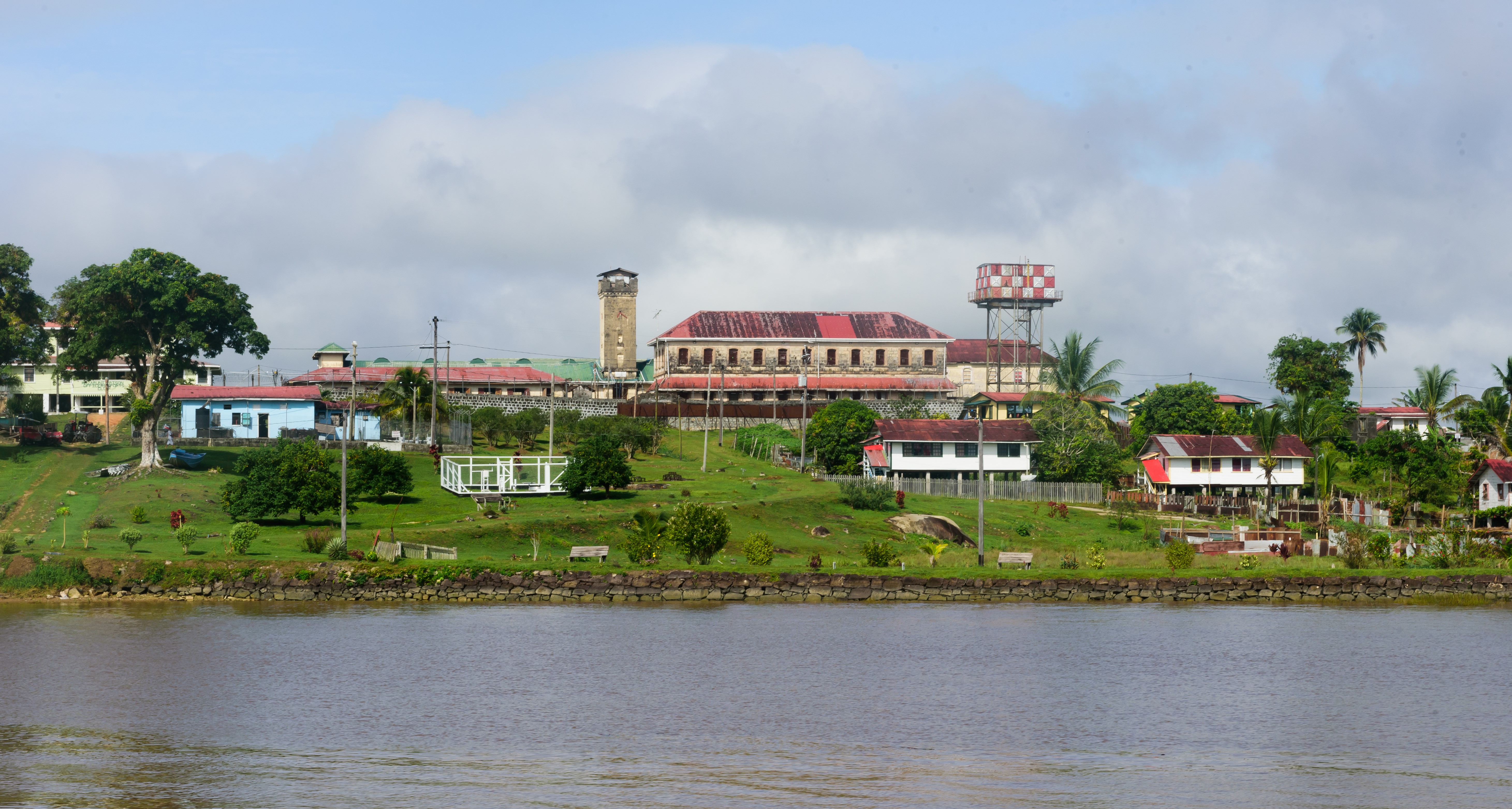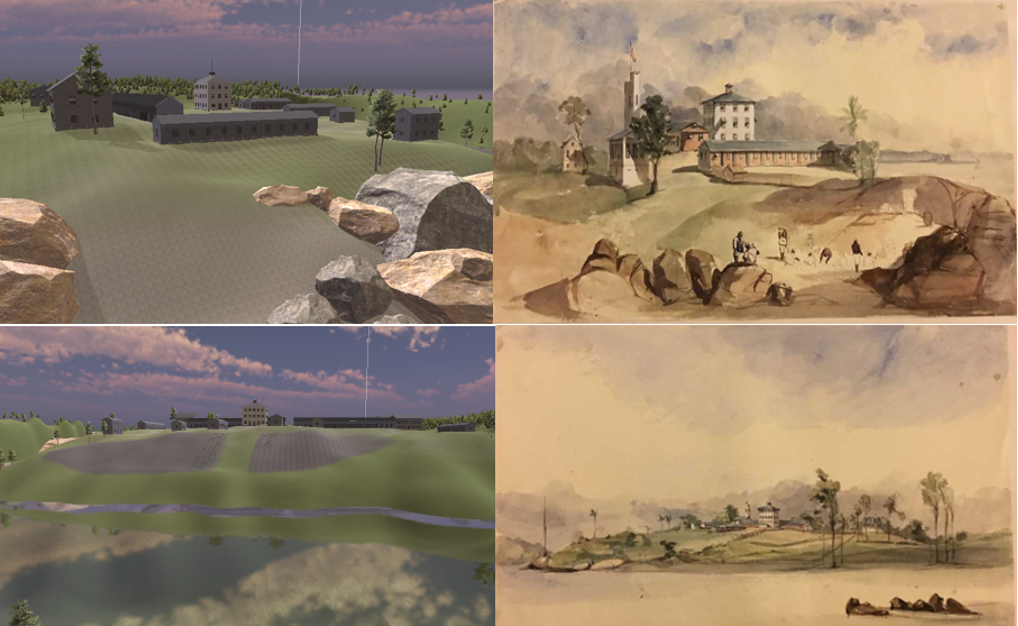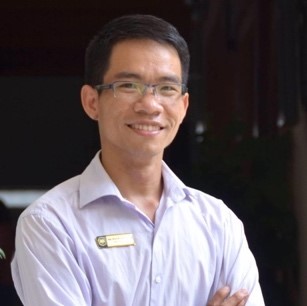
As we draw to the end of the year’s circle, we look back on some of the research which has taken place both in response to COVID-19 through our Urgency scheme, and wider projects which have been able to continue throughout this time. This year we were grateful to meet two of our awarded 2020 Fellows, Dr Patrick Laviolette and Dr Canh Nguyen.
This week, we celebrate the activities that have been able to commence throughout the year. Dr Nguyen offers a story on his interdisciplinary journey, Deputy Director Dr Diane Levine offers reflections on the Advanced Studies Group and we celebrate the work lead by Dr Kellie Moss on how Virtual Reality and apps are being used to make Guyana’s prisons safer. Follow our ‘Ghosts of Interdisciplinary Future’ page to see how we are approaching things differently in 2021, with the launch of our Pandemics scheme, Tiger Teams and Virtual Fellowship scheme.
“Is there a peculiar flavour in what you sprinkle from your torch?” asked Scrooge. “There is. My own.” “Would it apply to any kind of dinner on this day?” asked Scrooge. “To any kindly given. To a poor one most.” “Why to a poor one most?” asked Scrooge. “Because it needs it most.”
A CHRISTMAS CAROL, CHARLES DICKENS,1843
Responding to the pandemic: Eight Urgency Scheme Projects
We collaborated with the creative company Seed to develop a video narrative demonstrating the eight Urgency Scheme projects funded in response to the pandemic.
COVID-19 posed difficulties to industries, citizens and countries across the globe. The Leicester Institute for Advanced Studies responded by funding eight urgency projects to research nuanced societal challenges exacerbated by the pandemic. From air quality to transgender prisoner experience, our researchers are contributing new knowledge to the way in which the pandemic is shaping our world.
‘Lockdown: the spatialization of sexual and gender politics in a time of pandemic’, lead: Prof Gavin Brown; ‘Interactions between air pollution, SARS-CoV-2 and respiratory bacterial pathogens’, lead: Prof Julie Morrissey; ‘Virtual Reality in Guyana’s Prisons during COVID-19’, lead; Dr Kellie Moss; ‘Migrant inclusion in COVID-19 planning and response: a policy analysis’, lead: Dr Manish Pareek; ‘Changing spatial practices in the era of COVID-19 contact-tracing apps’, lead: Dr Stefano De Sabbata; ‘Transcending the bars: Transgender and non-binary prisoners’ experiences of the COVID-19 pandemic in England’, lead: Dr Olga Suhomlinova; ‘Perceptions of air quality and air quality action in Medellin due to Coronavirus’, lead: Dr Joshua Vande Hey; ‘Digitally-mediated pathways of resilience in vulnerable Brazilian children’, lead: Prof Panos Vostanis.
Virtual reality in Guyana Prisons

Virtual Reality and Guyana’s Prison System: Control and Infection Prevention
The aim of this project is to provide Guyana’s Prison Service (GPS) with the tools and information required to help tackle the spread of COVID-19 and other infectious diseases. Funded by the Leicester Institute for Advanced Studies (LIAS) this project is a collaboration between the GCRF ESRC project MNS in Guyana’s Jails, 1825 to the present day, the GPS, and the University of Leicester’s departments of Engineering, Respiratory Science, History, Politics, and International Relations (HYPIR). The COVID-19 pandemic has impacted prisons globally, with the housing density and population turnover contributing to an increased risk of contracting the virus compared to the general population. The first part of this project, the creation of a computer-generated three-dimensional visualisation of Mazaruni Prison is designed to tackle this problem by preparing and enabling prison staff to effectively control and contain the spread of COVID-19 in a safe environment. The second element, the creation and use of an interactive app serves two purposes: To enable medical officers to gather key information on the spread and effects of COVID-19 in Mazaruni prison. And, to provide the prison officers with targeted information on procedures to control infectious diseases. The World Health Organisation, the GPS, and Guyana’s COVID-19 Task Force have been instrumental in the creation of this guidance.
Dr Kwasi Sinclair, Head of Medical Department Guyana Prison Service, said:
‘I can attest that the department, and in general the prison service, is pleased to collaborate with the University of Leicester on this project ‘Virtual Reality in Guyana’s Prison System: Control and Infection Prevention’.
Find out more information by following the Figshare page.

Fellow 2020 Cohort Interdisciplinary Story

Hi friends and colleagues,
My name is Canh Nguyen, a Senior Lecturer at School of Banking, University of Economics Ho Chi Minh City (UEH), Vietnam and Research Fellow at Leicester Institute of Advanced Studies, University of Leicester, UK.
I am more than happy and honoured to tell you about my journey into interdisciplinary research. It started from 2017 when I had just finished my PhD in Economics, researching monetary policy transmission. It was my life’s luck to meet Professor Christophe Schinckus at RMIT University in June 2017, who has just moved to Vietnam from School of Business, University of Leicester. To be honest, it was my first time meeting and working with him, and he is a great professor! Chris has guided me through several topics from various disciplines. He also introduced me to Dr Marta Gasparin, Associate Professor at School of Business, University of Leicester. From there, I met many great academics and was awarded my LIAS Fellowship with Hosts Professor Mark Williams, Professor Daniel Ladley, Dr Marta Gasparin and Dr Martin Quinn. From this time, my journal was started.
I was given the chance to know about Econophysics, Innovation and Business. For the first time, I knew about the difference between Invention and Innovation, about the social impacts of research, about the environmental issues and sustainable development. The journey in interdisciplinary research and activities not only brings me a new vision, but also changes my point of view about my academic career toward social impacts as contributions for literature and society.
I have developed research and worked as a Postdoctoral researcher at both RMIT University and a LIAS Research Fellow at University of Leicester, researching climate change and the sustainable development at Mekong River area. I have to confess that without these chances and development in interdisciplinary cooperation, I could not have achieved such great results. I am delighted to have; over sixty published papers in prestige journals, five projects including two from Vietnam national fund and 2 projects funded by the British Academy.
At last, it is my pleasure to continue to advocate for interdisciplinary research and cooperation among academia that would contribute to the World.
With best wishes for everyone through this difficult time from Vietnam,
Canh Nguyen
The Advanced Studies Group Reflections

COVID-19 – for all the extraordinary and testing challenges it has brought to our daily lives – has also offered some new opportunities. Deputy Director Dr Diane Levine offers reflections on the Advanced Studies Group.
This is no less true for LIAS than for anyone else. We recently trialed a new collaboration process, intended to catalyse and galvanise an ambitious, challenge-led interdisciplinary research programme focused on pandemic. Our goal has been to provide a platform for colleagues from all three faculties to build a thematic research community who will, together, develop and deliver transformative research.
We started by setting up an ‘Advanced Study Group’. Comprising 19 colleagues from all three Colleges, facilitated by LIAS Advisory Group member Dr Laura Meagher the ASG met once for a short, half hour meet and greet, and then immersed themselves in a two hour virtual workshop in which they thrashed out some key themes and cross-cutting issues with distinctive ‘Leicester’ potential. Three sub-groups worked virtually for two further weeks, culminating in the review and publication of a LIAS Working Paper.
Here are our top five lessons we learned about seeding interdisciplinary, thematic collaboration through the ASG process.
Lesson 1: Condensing a process that would otherwise be a three day-long residential into a two-hour workshop was ambitious, and difficult. For future programmes, we would consider splitting virtual workshops into two, with a week between each workshop, to give people time to think and write.
Lesson 2: However far we have come in linking people across the university, colleagues still appreciate the chance to learn about one another’s research interests and approaches. Creating ‘virtual serendipity’ seems a bit of a holy grail; in the absence of serendipity, purposeful encounters could be a way forward.
Lesson 3: For balanced participation, we would ensure everyone contributing to subsequent collaborative writing has a clear task or role, and a contribution.
Lesson 4: Running an intense virtual workshop with a range of digital tools requires expert facilitation. Not just in managing people, but in managing the technology. Two separate individuals held these roles for our ASG, which means that our critical friend and facilitator Dr Laura Meagher could provide the focused questioning and support needed, while PhD researcher (and experienced facilitator) Sean Callaghan moved people around and managed the software.
Lesson 5: The ten principles of effective interdisciplinary team work need to be thought through in the planning stages. If you think your group members might struggle with any of these in a virtual context, you need to build compensatory activities or structures into the workshop structure to make sure the foundations for future work are strong.
